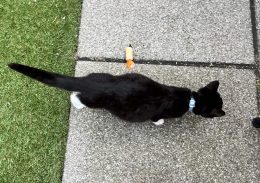
Feline coronavirus has been infecting cats in the UK for years, with many felines becoming infected with the illness and getting over it without their owners even realising.
However, feline coronavirus can mutate in some cats to become Feline Infectious Peritonitis, or FIP. This mutation is fatal but usually very rare, with less than 5% of coronavirus cases resulting in this.
The new coronavirus strain, first found in Cyprus, makes this mutation more likely to occur.
FIP is a progressive and often fatal illness. Recently, medication for this has been approved in the UK, but it is expensive, and it is not guaranteed to work.
The news of this strain is worrying cat owners in Lincolnshire and across the UK.
Marie Richards, a cat owner from Skellingthorpe, has 3 cats and says that this news has made her paranoid about their welfare.
“I hate the thought that my cats could suddenly become so unwell,” Marie said.
“Seeing this in the news is upsetting and makes me really worry. I feel like I have to be really vigilant to make sure I’m not missing anything.”
So, should people be so worried?
In a statement released by Lincoln’s Cats Protection charity, Dr Alison Richards says: “Veterinary experts are calling for vets across the UK to be vigilant for this new strain, particularly in cats that have come over from Cyprus.
“If you are at all concerned about your cat, we would recommend getting a health check with your vet.”

FIP can occur in two forms, wet or dry. Wet FIP can be spotted as a cat’s abdomen will become swollen and full of liquid.
Dry FIP is harder to spot, usually manifesting in vision issues or neurological issues for cats.
Dr Mark Goodman, from charity FIP Support UK, says that time is really of the essence with this illness.
“Any changes and uncertainty are inevitably worrying and cat owners should seek information from their veterinary surgeons as soon as they can.”
Anyone who is concerned about FIP should contact their vet. Further support can be found from Cats Protection or FIP Support UK.
